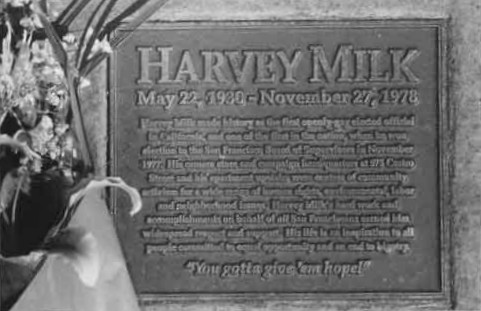Difference between revisions of "Harvey Milk"
m (Protected "Harvey Milk" [edit=sysop:move=sysop]) |
|
(No difference)
| |
Revision as of 09:16, 28 July 2008
|
Harvey Milk Born May 22, 1930 Assassinated November 27, 1978 City and County Board of Supervisors San Francisco, California 659,000 constituents |
Career Overview Elected November 1977 |
This plaque in the photograph above is embedded in the sidewalk on Castro Street in front of the shop that was once home to Harvey Milk’s camera store. The text reads:
Harvey Milk made history as the first openly-gay elected official in California, and one of the first in the nation, when he won election to the San Francisco Board of Supervisors in November 1977. His camera store and campaign headquarters at 575 Castro Street and his apartment upstairs were centers of community activism for a wide range of human rights, environmental, labor and neighborhood issues. Harvey Milk's hard work and accomplishments on behalf of all San Franciscans earned him widespread respect and support. His life is an inspiration to all people committed to equal opportunity and an end to bigotry. "You gotta give 'em hope!"
News article about Harvey Milk
How Milk Viewed Possible Assassination
by Maitland Zane
San Francisco Chronicle, November 28, 1978
A political testament in which Supervisor Harvey Milk seemed to foreshadow his own tragic death was released last evening by his friend, attorney John Wahl.
Wahl said that last November, shortly after his election as the city’s first openly gay supervisor, Milk was “aware of the possibilities of danger to any public figure who takes unpopular points of view” and made a tape “in case of just such a tragic event as occurred today.”
In the section of the tape recording released by Wahl, Milk said:
“I know that when a person is assassinated after they have achieved victory, there are several tendencies. One is to have some people go crazy in the streets, angry and frustrated, and the other is to have a big show or splash.
“Naturally I wanted neither.
“I cannot prevent anybody from getting angry or mad or frustrated. I can only hope they’ll turn that anger and frustration and madness into something positive so that hundreds will step forward, so that gay doctors will come out, gay lawyers, gay judges, gay bankers, gay architects… I hope that every professional gay will just say, ‘Enough!’ come forward and tell everybody, ‘Wear a sign, let the world know’…
“These are my strong requests knowing that it could happen. Hoping it doesn’t… and if it does, I think I’ve already achieved something.
“I think that it’s been worth it.”
And asked why Milk would make such a tape, Richard Pabich, an aide to the slain supervisor, said Milk “believed there was a real threat of something happening to him.
“He was aware he was a very controversial person. We got a lot of hate mail.”
Wahl said that Harvey Milk was “of course a gay man. His life was dedicated to full equality for gay people.”
“As a gay person who fought on Harvey’s side in the movement for freedom which he spearheaded,” Wahl said, “I know that Harvey will be remembered for his independence, his dedication, his inexhaustible energy and his concern for other people’s feelings.”
Wahl added: “You never had to guess where Harvey Milk stood. If you disagreed with him, he challenged you to think out your position clearly.
“He was willing and unafraid to ask the questions no one else would ask. He was willing to take risks. He cared about people.”
Return to Out and Elected in the USA index • Go to next article
